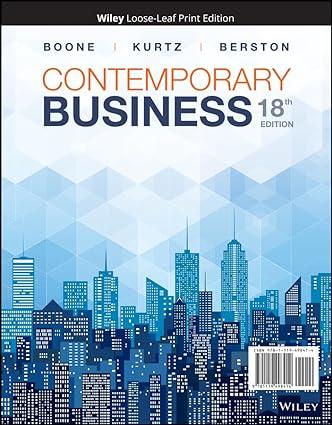Stricken with childhood polio, Frank C. Mars learned the art of hand dipping chocolate in his
Question:
Stricken with childhood polio, Frank C. Mars learned the art of hand dipping chocolate in his mother's kitchen and went on to start Mars back in the early 1900s. A privately held business in its fourth generation of family ownership, Mars has more than 85,000 employees around the globe. Some of the company's sweet brands include Snickers, Starburst, M&Ms, LifeSavers, Skittles, Juicy Fruit, and Orbit chewing gun. The company also owns Uncle Ben's Rice and Whiskas pet food. Recently, for the first time in 35 years, Mars opened a new $270 million, 500,000-square-foot chocolate factory in Topeka, Kansas, creating 200 new jobs. On a daily basis, the plant's output will amount to 8 million miniature Snickers candy bars and 39 million peanut M&Ms.
As America's seventh-largest private company with over $35 billion in sales, Mars, based in McLean, Virginia, rarely grants interviews to the media, even preferring to keep information like how the little “m” gets stamped on the outer shell of an M&M private. Internally, however, there remain few, if any, secrets—flat screens throughout its facilities display up-to-date financial information about the company. This reflects the company's philosophy of closely tying employee compensation to financial results. Employees can earn bonuses of 10% to 100% of their salaries for team performance.
For the sixth time, Mars recently made it onto Fortune's roster of 100 Best Companies to Work For. Known for its extensive training, community engagement, and health and wellness programs, Mars offers other benefits and perks in its highly collaborative environment, including free candy and being able to bring one's pet to work. Turnover is less than 6% among its U.S. employees, known as “Martians.” Perhaps the most significant feature of this “Best Company” is its internal advancement and reward opportunities. The company develops and encourages cross-division talent and expects its employees to follow its five guiding principles of quality, responsibility, mutuality, efficiency, and freedom. “The consumer is our boss, quality is our work and value for money is our goal,” reads the Mars quality principle.
Questions for Critical Thinking
1. Discuss how guiding principles, internal advancement, and reward opportunities such as those practiced at Mars can help with employee retention.
2. Discuss the pros and cons of company secrecy. Are there certain situations in which a company benefits by keeping information confidential? Are there other situations in which secrecy can be harmful?
Step by Step Answer:

Contemporary Business
ISBN: 9781119498414
18th Edition
Authors: Louis E. Boone, David L. Kurtz, Susan Berston





